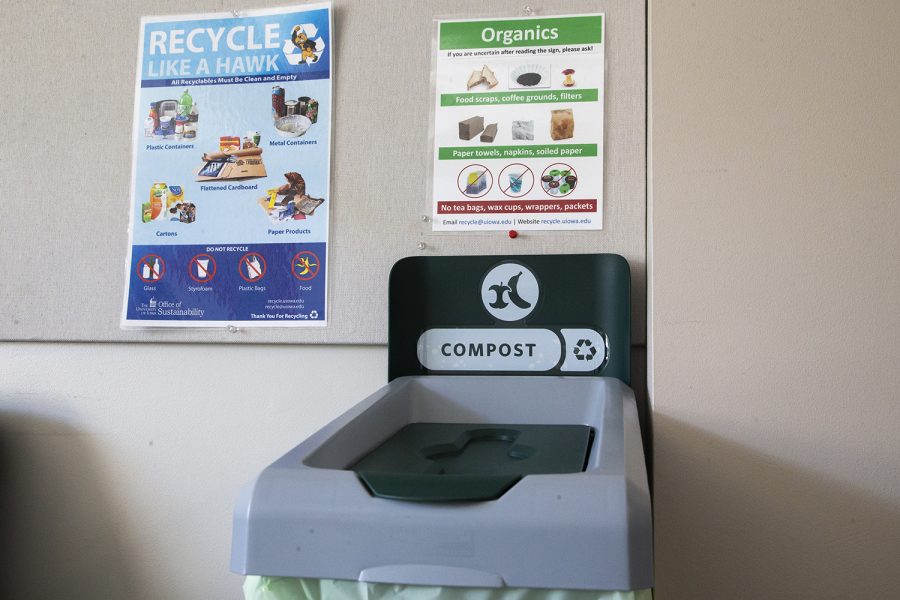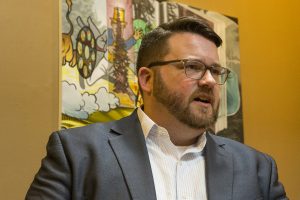Tippie staff work on composting to achieve waste-reduction goals
The Tippie College of Business created a composting program for its faculty and staff to fulfill waste-reduction goals.
A compost bin is seen in the staff and faculty lounge of the Pappajon Business Building on Tuesday, February 11, 2020. The bins were introduced in January to allow items like paper towels and pizza boxes to be recycled.
February 12, 2020
Tippie College of Business staff members have decided to develop their own waste-reduction system after witnessing successful composting programs in other colleges across campus.
Reducing waste had been a focus of Tippie in recent years, said Tippie Research, Support, and Sustainability Manager Sara Maples, who helped in the development of a compost program for faculty and staff. Maples said staff members had advocated for composting in their buildings.
She immediately started looking for ways to help Tippie and the UI support the Iowa City Climate Action Plan and their own sustainability goals through waste reduction.
“Waste reduction is something that our college has wanted to pursue in regard to our sustainability efforts for a while,” Maples said. “This specific [composting] project came out of an initiative that was spearheaded by our staff council [who] were really excited to pursue composting as part of our overall waste-reduction strategies.”
Maples said when discussing the college’s priorities with faculty, staff, and students, composting and energy conservation were two of the initiatives at the top of the college’s list.
Maples turned to the College of Engineering and the Engineering Staff Advisory Council President Rachel Marek for help.
“When discussing waste reduction, [the university] has many successful collaborators,” Maples said. “We have been able to learn from the College of Engineering from their initiatives and [understand] what the best practices for composting are. They helped us succeed right off the bat.”
RELATED: UISG discusses funding for new compost bins on campus
The compost program in the Seamans Center was first implemented in spring 2018, Marek said. The program was developed after seeing the success of the UI’s Office of Sustainability composting program within the college, she said.
“I joined [the] Engineering Staff Council in July 2017 and we wrote a proposal to attain funding to start a real composting initiative,” she said. “The interest was there. This is all self-contained. The College of Engineering provides the funding for the program and we contract with a university approved private vendor.”
The program is not centralized by the university, said Marek, and has expanded to 10 sites for composting over a few years. After seeing the work Tippie’s staff members put in to developing their own program, she assisted Maples with starting smaller with composting.
Maples said Tippie only has two locations for staff and faculty to compost, but their green bins hold 23 gallons of compostable waste, allowing those sites to be used by a multitude of people who decide to opt in to the program.
Marek was able to connect Tippie staff with Kaveh Mostafavi, the founder and CEO of Ecocare Supply and The Compost Ninja, the company and system that the College of Engineering uses to compost.
“We provide literature, education, and guidance on how to properly compost to all who are interested,” he said. “It’s pretty simple. The positive impact is clear to those who use it and so far, it has been positively received at the university by everyone.”
Mostafavi said it is important for individual departments to compost because there are thousands of people on campus and it is a way to reduce the strain on landfills and lower carbon emissions.
After only a month, Maples said she was encouraged by the amount of compost generated and that she looks forward to expansion to help the UI become more sustainable.
“We are going to look at the data and monitor both locations,” she said. “We would like to get a better feel from faculty and staff to get a better feel for what’s working. It would be wonderful for our students to have access to composting [in the future] as well. We would like to expand soon.”






